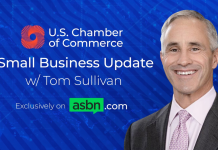In the latest episode of the U.S. Chamber of Commerce Small Business Update, Tom Sullivan, Vice President of Small Business Policy at the U.S. Chamber of Commerce, outlines the Chamber’s key priorities for 2025. With a focus on sustained economic growth, Sullivan discusses the push for tax reform extensions, deregulation efforts, and expanding global trade opportunities for small businesses. He also shares insights on Kelly Loeffler’s appointment as SBA Administrator and the potential impact of tariff policies on business certainty.
During today’s episode, Sullivan underlines the Chamber’s top small business priorities for 2025. He also emphasizes that achieving 3% sustained economic growth is the overarching goal, which will require two major policy actions:
- Reauthorizing the 2017 Trump tax reforms, particularly provisions like the 20% small business deduction and immediate expensing for R&D.
- Deregulation, to reduce red tape and free up time and capital for business owners.
Sullivan stressed that both measures are critical for small business expansion, as “time is money,” and eliminating regulatory burdens allows businesses to focus on growth.
On global trade, Sullivan pointed to a lack of free market agreements in recent years and highlighted the need to reauthorize the Generalized System of Preferences (GSP), which facilitates trade with developing nations, especially in Southeast Asia. He expressed optimism that a Republican-led government could move this forward.
Regarding Kelly Loeffler’s appointment as SBA Administrator, Sullivan praised her extensive business background—from running a family farm and trucking company to leading a Fortune 500 firm. He noted her strong advocacy for pro-growth policies, particularly tax reform and deregulation.
However, tariffs remain a major concern. Sullivan warned that uncertainty surrounding potential tariffs is already impacting small businesses, even before they take effect. He shared an example of a Minnesota-based aerospace manufacturer facing early contract renegotiations due to anticipated cost increases. While he acknowledged the administration’s focus on reducing drug trafficking, he argued that broad tariffs could have unintended negative consequences for businesses and consumers.
Despite these challenges, Sullivan remains optimistic, particularly about advancements in technology and AI, which are helping small businesses compete globally. When asked if now is a good time to start a business, he emphatically responded that it is—perhaps more than ever before.
"Not only have we seen a rise in new businesses, we're seeing at the White House an acknowledgment of the power of technology and the power of artificial intelligence to allow small business owners to compete against multinational companies all over the world." Tom Sullivan








